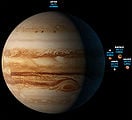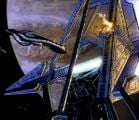Jupiter: Difference between revisions
From Halopedia, the Halo wiki
Sith Venator (talk | contribs) |
NightHammer (talk | contribs) No edit summary |
||
| Line 1: | Line 1: | ||
{{Era|Human|UNSC|HCW}} | {{Era|Forerunner|Covenant|Human|UNSC|HCW|Post}} | ||
{{ | {{Wikipedia}} | ||
{{Planet | {{Planet | ||
|name=Jupiter | |name=Jupiter | ||
|image=[[Image:Jupiter.jpg| | |image=[[Image:Jupiter.jpg|300px]] | ||
|star, position= | |star, position= [[Sol system|Sol]], V | ||
|moon(s)= [[Jovian Moons | |moon(s)=67; [[Jovian Moons|Jovian moons]] | ||
|demonym=Jovian | |demonym=Jovian | ||
|gravity=2.64 G | |||
|gravity= | |diameter={{Convert|139822|km|mi}} | ||
|diameter= | |daylength=9 hours, 56 minutes | ||
|daylength= | |yearlength=12 years | ||
|yearlength= | |||
|atmosphere= Various gases | |atmosphere= Various gases | ||
| | |temperature= | ||
|population= | |population= | ||
|species= | |species= | ||
|government=[[Unified Earth Government]] | |||
|government= | |||
|technology tier= | |technology tier= | ||
}} | }} | ||
'''Jupiter''' is the largest planet in the [[ | '''Jupiter''' is a gas giant and the largest planet in the [[Sol system]]. It was the site of various battles, dating back to the [[Interplanetary War]], and up to the [[Human-Covenant War]]. | ||
==History== | ==History== | ||
===Early history=== | |||
Jupiter has been known since ancient times, however its four major moons, also known as [[Galilean moons]], were only discovered in 1610 by [[Wikipedia:Galileo Galilei|Galileo]]. In 1892, a fifth moon of Jupiter was discovered, but smaller than the four others. [[Human]]s first sent spacecraft in late 1973, known as the ''Pioneer 10''. Other spacecraft soon followed, thus discovering more moons and increasing the understanding of the gas giant. Jupiter has rings that are much fainter than those of Saturn's, which were discovered years later after the visit of the first spacecraft. | Jupiter has been known since ancient times, however its four major moons, also known as [[Galilean moons]], were only discovered in 1610 by [[Wikipedia:Galileo Galilei|Galileo]]. In 1892, a fifth moon of Jupiter was discovered, but smaller than the four others. [[Human]]s first sent spacecraft in late 1973, known as the ''Pioneer 10''. Other spacecraft soon followed, thus discovering more moons and increasing the understanding of the gas giant. Jupiter has rings that are much fainter than those of Saturn's, which were discovered years later after the visit of the first spacecraft. | ||
Humans began colonizing Jupiter's moons in [[2080]].<ref>'''[[Halo Encyclopedia]]''', ''page 32''</ref> | Humans began colonizing Jupiter's moons in [[2080]].<ref>'''[[Halo Encyclopedia]]''', ''page 32''</ref><ref>'''[[Halo: Contact Harvest]]''', ''page 37''</ref> | ||
===Jovian Moons Campaign=== | ===Jovian Moons Campaign=== | ||
{{ | {{Main|Jovian Moons Campaign}} | ||
During the Jovian Moons Campaign of [[2160]], the [[Frieden]] secessionist movement attacked the [[UN Colonial Advisors]] stationed on [[Io]]. The attack led to the Jovian Moons Campaign and the beginning of the [[Interplanetary War]].<ref>[http://halostory.bungie.org/halostory.timeline.html '''halo.bungie.org''': ''Halo Story Timeline'']</ref> | During the Jovian Moons Campaign of [[2160]], the [[Frieden]] secessionist movement attacked the [[UN Colonial Advisors]] stationed on [[Io]]. The attack led to the Jovian Moons Campaign and the beginning of the [[Interplanetary War]].<ref>[http://halostory.bungie.org/halostory.timeline.html '''halo.bungie.org''': ''Halo Story Timeline'']</ref> | ||
===Human-Covenant War=== | ===Human-Covenant War=== | ||
During the [[Human-Covenant War]], Jupiter was once again a location of particular importance.<ref>'''[[Halo: The Fall of Reach]]'''</ref> [[Io Station]] detected | During the [[Human-Covenant War]], Jupiter was once again a location of particular importance.<ref>'''[[Halo: The Fall of Reach]]'''</ref> On [[2552#October|October 20, 2552]], the [[Prophet of Regret|High Prophet of Regret]]'s [[Fleet of Sacred Consecration]] exited [[slipstream space]] relatively close to Jupiter.<ref name="terminal8">'''[[Halo 2 Anniversary]]''', ''[[Terminal/Halo 2 Anniversary|Terminal 15]]''</ref> [[Io Station]] detected the [[Covenant fleet]] of fifteen ships and reported the discovery to Fleet Admiral Lord [[Terrence Hood]] a few moments before the [[Battle of Earth]].<ref>'''[[Halo 2]]''', campaign level ''[[Cairo Station (level)|Cairo Station]]''</ref> | ||
Later, around [[2552#November|November 8, 2552]], the [[Forerunner Dreadnought]] and the [[Truth's fleet|High Prophet of Truth's fleet]] passed Jupiter while on their way to Earth.<ref>'''[[Halo: Uprising]]''', ''[[Halo: Uprising Issue 1|Issue #1]]''</ref> Following the [[Covenant]]'s invasion of the Sol system, most Jovian colonies survived the Covenant assault largely unscathed.<ref>[https://www.halowaypoint.com/en-us/universe/species/humans '''Halo Waypoint''': ''Humans'']</ref> | |||
== | ==Description== | ||
[[File: | [[File:Jupiters Moons.jpg|thumb|215px|Jupiter and its moons]] | ||
[[ | Jupiter is a large gas giant and the fifth planet in orbit in the [[Sol system]]. With a diameter of 139,822 kilometres (86,881 miles), Jupiter is the largest planet in the system. Located between Jupiter and [[Mars]], a large [[asteroid]] belt is held in place by the gas giant's strong gravitational forces. The upper atmosphere of Jupiter is largely composed of [[hydrogen]] gas, while [[helium]] gas makes up about 10%. The gas giant's atmosphere additionally contains small amounts of [[methane]], [[ammonia]], [[water]], [[Wikipedia:Ethane|ethane]], [[Wikipedia:Hydrogen deuteride|hydrogen deuteride]], and [[Wikipedia:Carbon|carbon]]. Jupiter is home to the Great Red Spot, a persistent [[Wikipedia:Anticyclone|anticyclonic]] storm located near the planet's equator. The winds of Jupiter blow at a speeds of 430 to 680 kilometers per hour. [[Human]] scientists have studied Jupiter's winds to learn about the formation of storms. The gas giant's intense radiation, planetary ring system, and its orbital path have also been analyzed by scientists to help them explain other mysteries in the galaxy.<ref name="ENC295">'''Halo Encyclopedia''', ''page 295'' (2011 edition)</ref> | ||
Jupiter is orbited by sixty-seven [[natural satellite]]s, referred to as the the [[Jovian Moons|Jovian moons]]. At least four—the [[Wikipedia:Galilean moons|Galilean moons]] composed of [[Europa]], [[Ganymede]], [[Io]], and [[Callisto]]—have been colonized by humanity.<ref name="xbox">'''[[Xbox.com/Halo]]'''</ref> Unlike the moons of the other three gas giants in the Sol system, they have largely been explored and receive comparatively more heat from Sol. Due to these factors, the moons of Jupiter are favored over those of the other gas giants.<ref name="ENC295"/> | |||
' | |||
''' | ==Gallery== | ||
<gallery> | |||
File:Jupiter&moons.jpg|The scale size of Jupiter and its moons | |||
File:Jupiter_uprising.jpg|A Covenant battle group and the [[Forerunner Dreadnought]] seen in the proximity of Jupiter | |||
File:H2A Terminals - IoStation.jpg|Io Station and Io orbiting Jupiter | |||
File:H2A Terminals - Fleet at Io.jpg|A Covenant fleet over Jupiter | |||
</gallery> | |||
==List of appearances== | ==List of appearances== | ||
*''[[Halo 2]]'' {{ | *''[[Halo 2]]'' {{Fm}} | ||
*''[[Halo: Uprising]]'' {{1st}} | *''[[Halo: Uprising]]'' {{1st}} | ||
*''[[Halo: Contact Harvest]]'' {{Mo}} | |||
*''[[Halo: Evolutions - Essential Tales of the Halo Universe]]'' | *''[[Halo: Evolutions - Essential Tales of the Halo Universe]]'' | ||
**''[[The Impossible Life and the Possible Death of Preston J. Cole]]'' {{Mo}} | **''[[The Impossible Life and the Possible Death of Preston J. Cole]]'' {{Mo}} | ||
Revision as of 21:28, February 23, 2015
| There is more information available on this subject at Jupiter on the English Wikipedia. |
Jupiter is a gas giant and the largest planet in the Sol system. It was the site of various battles, dating back to the Interplanetary War, and up to the Human-Covenant War.
History
Early history
Jupiter has been known since ancient times, however its four major moons, also known as Galilean moons, were only discovered in 1610 by Galileo. In 1892, a fifth moon of Jupiter was discovered, but smaller than the four others. Humans first sent spacecraft in late 1973, known as the Pioneer 10. Other spacecraft soon followed, thus discovering more moons and increasing the understanding of the gas giant. Jupiter has rings that are much fainter than those of Saturn's, which were discovered years later after the visit of the first spacecraft.
Humans began colonizing Jupiter's moons in 2080.[1][2]
Jovian Moons Campaign
- Main article: Jovian Moons Campaign
During the Jovian Moons Campaign of 2160, the Frieden secessionist movement attacked the UN Colonial Advisors stationed on Io. The attack led to the Jovian Moons Campaign and the beginning of the Interplanetary War.[3]
Human-Covenant War
During the Human-Covenant War, Jupiter was once again a location of particular importance.[4] On October 20, 2552, the High Prophet of Regret's Fleet of Sacred Consecration exited slipstream space relatively close to Jupiter.[5] Io Station detected the Covenant fleet of fifteen ships and reported the discovery to Fleet Admiral Lord Terrence Hood a few moments before the Battle of Earth.[6]
Later, around November 8, 2552, the Forerunner Dreadnought and the High Prophet of Truth's fleet passed Jupiter while on their way to Earth.[7] Following the Covenant's invasion of the Sol system, most Jovian colonies survived the Covenant assault largely unscathed.[8]
Description
Jupiter is a large gas giant and the fifth planet in orbit in the Sol system. With a diameter of 139,822 kilometres (86,881 miles), Jupiter is the largest planet in the system. Located between Jupiter and Mars, a large asteroid belt is held in place by the gas giant's strong gravitational forces. The upper atmosphere of Jupiter is largely composed of hydrogen gas, while helium gas makes up about 10%. The gas giant's atmosphere additionally contains small amounts of methane, ammonia, water, ethane, hydrogen deuteride, and carbon. Jupiter is home to the Great Red Spot, a persistent anticyclonic storm located near the planet's equator. The winds of Jupiter blow at a speeds of 430 to 680 kilometers per hour. Human scientists have studied Jupiter's winds to learn about the formation of storms. The gas giant's intense radiation, planetary ring system, and its orbital path have also been analyzed by scientists to help them explain other mysteries in the galaxy.[9]
Jupiter is orbited by sixty-seven natural satellites, referred to as the the Jovian moons. At least four—the Galilean moons composed of Europa, Ganymede, Io, and Callisto—have been colonized by humanity.[10] Unlike the moons of the other three gas giants in the Sol system, they have largely been explored and receive comparatively more heat from Sol. Due to these factors, the moons of Jupiter are favored over those of the other gas giants.[9]
Gallery
A Covenant battle group and the Forerunner Dreadnought seen in the proximity of Jupiter
List of appearances
- Halo 2 (First mentioned)
- Halo: Uprising (First appearance)
- Halo: Contact Harvest (Mentioned only)
- Halo: Evolutions - Essential Tales of the Halo Universe
- The Impossible Life and the Possible Death of Preston J. Cole (Mentioned only)
- Halo 2 Anniversary (Mentioned only)
Sources
- ^ Halo Encyclopedia, page 32
- ^ Halo: Contact Harvest, page 37
- ^ halo.bungie.org: Halo Story Timeline
- ^ Halo: The Fall of Reach
- ^ Halo 2 Anniversary, Terminal 15
- ^ Halo 2, campaign level Cairo Station
- ^ Halo: Uprising, Issue #1
- ^ Halo Waypoint: Humans
- ^ a b Halo Encyclopedia, page 295 (2011 edition)
- ^ Xbox.com/Halo



